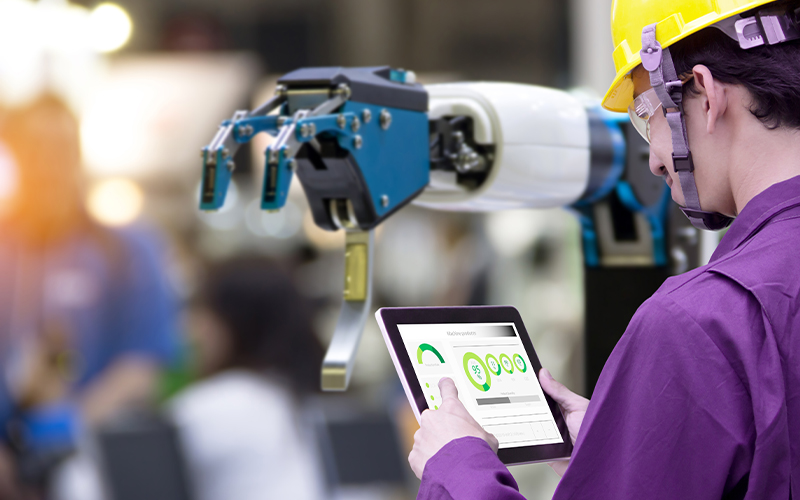Robotic Process Automation
Intelligent automation: Enhancing RPA use cases with AI
In recent times, RPA has had a compelling impact on technological advancement and transformation in organisations by automating a range of repetitive tasks. However, a recent survey by a leading IT corporation stated that an astonishing 73% of executives interviewed informed that they were preparing for the next big step, intelligent automation (IA).
Combining RPA with AI mimics human work and intelligence to perform various tasks and effectively transform operations. The incorporation of AI boosts the scope of RPA implementation, thus improving the scale and quality of RPA use cases.
Benefits of RPA and AI
RPA might be capable of performing pre-programmed, reiterative tasks, but with the help of AI, a whole new dimension of process automation can be explored:
- Manifold increase in process efficiency
- Reduced risks and costs
- Consistent scalability
- Fraud detection and security of data
- Customer relationship management
- Employee onboarding
- Product lifecycle management
- Inventory forecasting
- Choose the processes to automate
- Set up a clear governance structure
- Have realistic expectations
- Develop digital process re-engineering
- Select the right RPA tools and operators
Performing repetitive tasks that RPA excels at and combined with AI’s pattern-matching and decision-making powers make IA a formidable competitor for human cognitive abilities. This combination substantially increases process efficiency.
Humans in the workforce wear out due to time and age. Repetitive processes take a toll on their physical and mental alertness. Automation reduces these risks and bypasses human fallibility and the costs associated with it.
One of the benefits of RPA is that it replicates its approach to a task repeatedly, thereby increasing efficiency and reducing manual labour. However, with the addition of AI to RPA, businesses can maintain consistency in their processes as well as analysing changes and adapting to them in real time.
Traditional optical character recognition (OCR) and RPA are no match for the large unstructured datasets within the organisation. With AI, the system’s previous experience with numerous iterations enable it to take new decisions despite the data being unstructured. Every little detail is a data point for the system. With historical patterns, it can easily recognise frauds, security gaps, and scope for improvement.
How does AI enhance RPA use cases?
An RPA solution is a tirelessly working system that is programmed to perform a set of tasks. For every job that RPA can aid, AI can help do much more. Let us take a look at some of the use cases.
Customer relationship management (CRM) systems have been popular for a long time. However, the use of AI has not yet been fully realised. CRM systems manage large datasets, process information, and retrieve data for sales and marketing professionals.
However, a US organisation's research claims that only 12% of CRM users implement an AI-powered CRM tool. As much as one workday per week, or 17% of a sales professional's time, can be saved by using an intelligent automation tool. Vital customer trends, communication, transcripts, and key customer behaviour insights are complicated datasets to analyse. An IA-based CRM system can render such information with a simple click.
A strictly administrative task like that of an HR department might seem unlikely to implement RPA. However, the paperwork and long processes can be simplified by RPA. Additionally, the on-boarding process is subject to frequently changing regulations. IA can automate this process and comply with the regulations promptly. The automated process can manage the documents, IT system, and other essentials.
Product lifecycle management manages data about products right from their design to their sale. Systems from different sectors like finance, design, and sales are not necessarily compatible with each other. Neither is the data set consistent. Sharing structured and unstructured data and goals across such systems need human intervention. In this case, IA's cross-platform support can be a boon for product lifecycle management. With the advent of IA, one can expect their business to grow financially and improve output.
Traditional inventory management involves the manual processing of several tasks. Communication, generating work orders and invoicing, and several complex back-office processes can be managed by intelligent automation. IA can take over the analysis and data mapping and save human hours. An automated supply chain, inventory tracking, and handling shipping become crucial to the experience of customers and businesses.
Embracing IA
Intelligent automation solutions are remarkably enhancing business operations and performance. The growing prominence of IA is making organisations jump on the IA bandwagon. However, intelligent automation should be thoughtfully implemented through these few steps:
For organisations on the digital transformation journey, agility is key in responding to a rapidly changing technology and business landscape. Now more than ever, it is crucial to deliver and exceed on organisational expectations with a robust digital mindset backed by innovation. Enabling businesses to sense, learn, respond, and evolve like a living organism, will be imperative for business excellence going forward. A comprehensive, yet modular suite of services is doing exactly that. Equipping organisations with intuitive decision-making automatically at scale, actionable insights based on real-time solutions, anytime/anywhere experience, and in-depth data visibility across functions leading to hyper-productivity, Live Enterprise is building connected organisations that are innovating collaboratively for the future.
How can Infosys BPM help?
With intelligent process automation — an ideal blend of RPA and AI — Infosys BPM delivers a solution that ensures a zero-touch process and innovative service design. Businesses can leverage our cutting-edge RPA capabilities to achieve process perfection. Intelligent automation tools from Infosys BPM can take over the mundane and complex workflow elements and create space for human ingenuity.
Integrate RPA technology and develop intelligent processes while achieving unprecedented agility, reduced effort, and increased productivity with our RPA solutions. Our intelligent process automation services are built for varied and complex client environments. Thousands of hours of learning and testing have shaped our IA solutions to perfection. Infosys BPM allows you to improve efficiency, amplify business value, and enhance customer experience.






